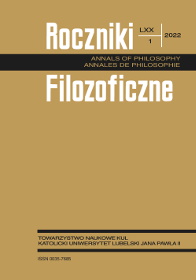Teologia aktualnej sekwencji
Abstrakt
Autor w swoim artykule szkicuje obraz ogólnej teologii, która odchodzi od koncepcji wolności jako „alternatywnych możliwości” na rzecz wolności jako „aktualnej sekwencji”. Autor odróżnia swoje podejście od rozwiniętej teorii teizmu otwartego Williama Haskera. Pogląd autora na temat Bożej przedwiedzy mieści się pomiędzy ideą pełnej przedwiedzy a ideą jej całkowitego braku (teizm otwarty).
Bibliografia
Alston, William “The Inductive Argument for Evil and the Human Cognitive Condition.” Philosophical Perspectives 5:29– 67.
Byerly, T. Ryan. 2014. The Mechanics of Divine Foreknowledge and Providence: A Time-Ordering Account. London: Bloomsbury.
Byerly, T. R. 2017. “Free Will Theodicies for Theological Determinists.” Sophia 56:289–310.
Clifford, William. 1879. Lectures and Essays. Vol. 2. Edited by Frederick Pollack and Leslie Stephen. London: Macmillan.
Conee, Earl, and Richard Feldman, eds. 2014. Evidentialism: Essays in Epistemology. Oxford: Clarendon Press.
Craig, William Lane. 1988. The Problem of Divine Foreknowledge and Future Contingents from Aristotle to Suarez. Leiden: Brill.
Edwards, Jonathan. (1754) 1957. The Works of Jonathan Edwards: Freedom of the Will. Edited by Paul Ramsey. New Haven: Yale University Press.
Feldman, Richard. 2014. “Evidence of Evidence is Evidence.” In The Ethics of Belief, edited by Jonathan Matheson and Rico Vitz, 284–300. New York: Oxford University Press.
Fischer, John Martin. 1994. The Metaphysics of Free Will. Oxford: Blackwell.
Fischer, John Martin. 2007. “Compatibilism.” In Four Views on Free Will, edited by John Martin Fischer, Robert Kane, Derk Pereboom, and Manuel Vargas, 44–84. Oxford: Blackwell.
Fischer, John Martin. 2016. Our Fate: Essays on God and Free Will. New York: Oxford University Press.
Fischer, John Martin. 2017. “Replies to My Critics.” Science, Religion, and Culture 4 (2): 79–101.
Fischer, John Martin. Forthcoming. “The Frankfurt-Style Cases: Extinguishing the Flickers of Freedom.” Inquiry.
Fischer, John Martin. In progress. “Bootstrapping Supercomprehension.”
Fischer, John Martin, and Mark Ravizza. 1998. Responsibility and Control. New York: Cambridge University Press.
Fischer, John Martin, ed. 1989. God, Foreknowledge, and Freedom. Stanford, CA: Stanford University Press.
Frankfurt, Harry. 1969. “Alternate Possibilities and Moral Responsibility.” Journal of Philosophy 66:829–39.
Frankfurt, Harry. 2003. “Some Thoughts Concerning PAP.” In Moral Responsibility and Alternative Possibilities: Essays on the Importance of Alternative Possibilities, edited by David Widerker and Michael McKenna, 339–45. Aldershot: Ashgate.
Ginet, Carl. 1966. “Might We Have No Choice?” In Freedom and Determinism, edited by Keith Lehrer, 87–104. New York: Random House.
Ginet, Carl. 1990. On Action. Cambridge: Cambridge University Press.
Hart, H. L. A. 1973. “Rawls on Liberty and Its Priority.” University of Chicago Law Review 40:534–55.
Hart, Herbert L. A., and Anthony M. Honoré. 1978. Causation in the Law. Oxford: Oxford University Press.
Hasker, William. 1989. God, Time, and Knowledge. Ithaca, NY: Cornell University Press.
Hasker, William. 2013. Providence, Evil, and the Openness of God. New York–London: Routledge.
Hasker, William. 2008. The Triumph of God over Evil: Theodicy for a World of Suffering. Downers Grove, IL: InterVarsity Press.
Hume, David. 1748. An Essay Concerning Human Understanding.
Hunt, David. 2017. “John Martin Fischer on the Puzzle of Theological Fatalism.” [Part of a book symposium on J. M. Fischer, Our Fate: Essays on God and Free Will] Science, Religion, and Culture 4:15–26.
Lewis, David. 1981. “Causal Decision Theory.” Australasian Journal of Philosophy 59:59–30.
Mackie, John. 1955. “Evil and Omnipotence.” Mind 64:200–212.
Pereboom, Derk. 2007. Living Without Free Will. Cambridge: Cambridge University Press.
Pereboom, Derk. 2014. Free Will, Agency, and Meaning in Life. Oxford: Oxford University Press.
Pike, Nelson. 1965. “Divine Omniscience and Voluntary Action.” Philosophical Review 74:27–46.
Plantinga, Alvin. 1977. God, Freedom, and Evil. Grand Rapids, MI: Eerdmans.
Rawls, John. 1971. A Theory of Justice. Cambridge, MA: Harvard University Press.
Spencer, Jack. 2020. “No Crystal Balls.” Nous 54:105–25.
Stump, Eleonore. 2012. Wandering in Darkness: Narrative and the Problem of Suffering. New York: Oxford University Press.
Stump, Eleonore, and Norman Kretzmann. 1981. “Eternity.” Journal of Philosophy 78:429–58.
Stump, Eleonore, and Norman Kretzmann. 1985. “Absolute Simplicity.” Faith and Philosophy 2:353–82.
Swinburne, Richard. 1998. Providence and the Problem of Evil. Oxford: Oxford University Press.
Todd, Patrick. 2012. “Manipulation and Moral Standing: An Argument for Incompatibilism.” Philosophical Imprint 12:1–18.
Todd, Patrick. 2017. “A Unified Account of the Moral Standing to Blame.” Nous 53:347–74.
Todd, Patrick. 2018. “Does God Have the Moral Standing to Blame?” Faith and Philosophy 35:33–55.
Van Inwagen, Peter. 1983. An Essay on Free Will. Oxford: Clarendon Press.
Van Inwagen, Peter. 2008. “What Does an Omniscient Being Know?” In Oxford Studies in Philosophy of Religion, edited by Jonathan Kvanvig, 216–30. New York: Oxford University Press.
Van Inwagen, Peter. 2008. The Problem of Evil. Oxford: Oxford University Press.
Wallace, R. Jay. 2010. “Hypocrisy, Moral Address, and the Equal Standing of Persons.” Philosophy and Public Affairs 38:307–41.
Widerker, David, and Michael McKenna, eds. 2003. Moral Responsibility and Alternative Possibilities. Aldershot: Ashgate.
Wykstra, Stephen J. 1984. “The Human Obstacle to Evidential Arguments from Suffering: On Avoiding the Evils of ‘Appearances’.” International Journal for Philosophy of Religion 16:73–94.
Wykstra, Stephen J. 1996. “Rowe’s Noseeum Arguments for Evil.” In The Evidential Argument from Evil, edited by Daniel Howard-Snyder, 126–50. Bloomington, IN: Indiana University Press.
Zagzebski, Linda T. 1996. The Dilemma of Freedom and Foreknowledge. New York: Oxford University Press.
Copyright (c) 2022 Roczniki Filozoficzne

Utwór dostępny jest na licencji Creative Commons Uznanie autorstwa – Użycie niekomercyjne – Bez utworów zależnych 4.0 Międzynarodowe.





